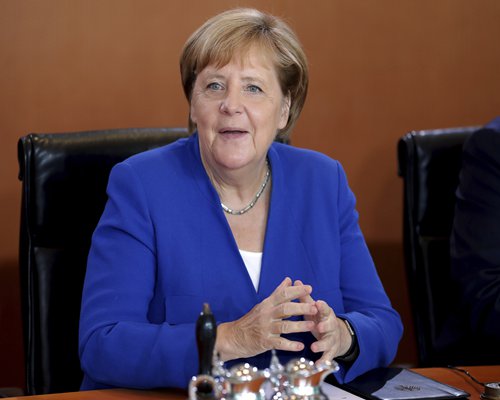German chancellor’s trip a benchmark in many ways
By He Zhigao Source:Global Times Published: 2019/9/5 20:18:40

Photo: IC
German Chancellor Angela Merkel kicks off Friday a two-day visit to China, less than 15 months after her last trip to the country. Germany is facing an economic downturn, while populist parties have surged in the country and the international situation is becoming more uncertain. As such, it is worthy of attention whether Merkel's visit to China, which has some special meaning, could be a new start to the betterment of China-Germany and China-Europe ties.
Affected by global economic downturn and international trade disputes, Germany is expected to have an economic growth of 0.5 percent in 2019, less than the 1.4 percent growth of 2018. German GDP in the second quarter of 2019 declined by 0.1 percent and the trend is likely to continue, which reflects a high risk of recession.
Germany was the world's third-largest exporting country in 2016, only behind China and the US, and the decline in the country's foreign trade has slowed its economic growth. Thus, Germany needs external support. When US-Europe economic disputes are spiraling upward, China-Germany cooperation is necessary. Enhancing trade with China, which remained the most important trading partner of Germany in 2018 with a total trade volume of 199.3 billion euros ($218.7 billion), will help revitalize Germany's economy.
During the EU-China summit in Brussels in April, both sides agreed to work toward a conclusion of a comprehensive bilateral investment agreement by 2020. But according to a report released in May by accounting firm Ernst & Young, in the first quarter of 2019, the announced value of China's mergers and acquisitions deal in Europe had decreased by nearly 90 percent year on year. The decline was due to the EU's "framework for the screening of foreign direct investments," which was officially effective in April. Such being the case, trade and investment issues will be a key topic of Merkel's trip to China.
Germany is also facing internal political crises. The surge of the far-right Alternative for Germany (AfD) Party in elections, the disputes within the ruling Christian Democratic Union of Germany Party and the end of Merkel's tenure in 2021 could lead to a political dilemma in Germany and thus an absence of leadership in Europe.
AfD won the second-most votes in parliamentary elections on Sunday in two eastern German states, namely Saxony and Brandenburg. In addition, during the election to the European Parliament in May, the European Greens Party received about 20 percent of votes in Germany, becoming the country's second-biggest party in the European Parliament. All these have brought about new uncertainties for the German ruling coalition and political structure.
In the context of internal constraints, Merkel's visit to China is an opportunity to reshape Germany's confidence and build consensus internally, which can help Berlin relieve domestic pressures and strive for external opportunities.
The return of competition between big powers and international geopolitics is another challenge facing Germany. US President Donald Trump's Europe policy didn't favor transatlantic relations but widened a split within the EU. Berlin wishes to integrate Moscow within the European system to mitigate tensions between the two sides, but Trump cannot accept a détente in Berlin-Moscow ties. Besides, Trump opposes EU's attitude on the Iranian nuclear issue.
The EU regards China as a "systemic rival" in the report EU-China - A strategic outlook issued in March, and it is becoming a consensus among EU members. However, China and Germany are major economies and defenders of multilateralism, therefore, their improving cooperation is significant.
In the second half of 2020 when Germany will hold the rotating presidency of the EU, whether Germany could turn the EU-China summit into a 28+1 cooperation format will determine the route and mechanism of China-EU relations in the future and determine whether Berlin and Beijing could jointly deal with international and regional challenges, as well as promote economic development, peace and stability of the world.
Germany needs a new partner from outside to help it advance in the game of big powers. As Chinese economic and political influence rises, Merkel is more pragmatically seeking a balance of interests and strengthening talks with China to promote mutually beneficial win-win cooperation.
Some Germans think that they should contain China as it is a threat to them, while others believe China will bring them development opportunities. Such contradiction is becoming more severe. Merkel's visit to China will, at least, demonstrate that Berlin is willing to have strategic talks with Beijing and seek consensus through high-level dialogues, making cooperation the keynote of China-Germany relations.
The author is research fellow with the Institute of European Studies, Chinese Academy of Social Sciences. opinion@globaltimes.com.cn
Posted in: VIEWPOINT,CHINA-EUROPE